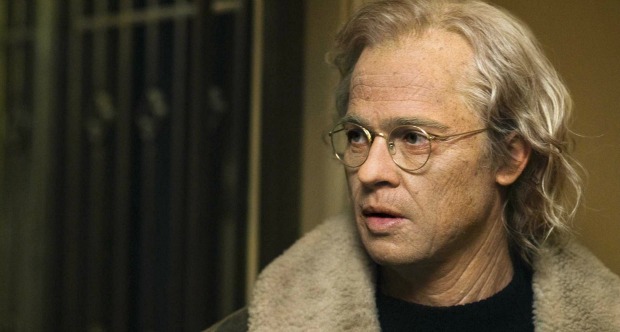The Curious Case of Benjamin Button
A boy is born old and grows younger, falls in love and has adventures.
Plot summary
Tells the story of Benjamin Button, a man who starts aging backwards with bizarre consequences.

By now everyone knows the basic story; a boy is born old and grows younger, falls in love and has adventures, before ending up as a baby, cared for by his geriatric wife. People had their reservations: could Brad Pitt convince audiences that he was every age between ninety and nineteen? Could David Fincher pull off a beautiful, epic romance? Could Eric Roth, writer of Forest Gump, write a film that didn’t induce at least part of the audience to nausea? The answer, for the most part, is yes.
Because of his obvious attractiveness, Pitt is often sidelined as an actor. People overlook his talent and focus on his looks. In this film, with his beauty hidden under make-up and subtle but very effective CGI effects, his skill as an actor shines through. It can be no easy task for a 43 year old to play a 7 year old in an 80 year old’s body, but somehow he manages it, and the audience’s disbelief is suspended. You almost forget you’re watching one of the biggest stars in the world because you care so deeply for the character. When Benjamin reaches his teens, and the actor switches from Pitt to a child, going through stages of dementia as he dies of old age, you feel the switch as Cate Blanchett’s character Daisy must, that the recognition of the person you loved has gone, replaced by something almost unrecognisable.
David Fincher is without doubt an amazing director, but his previous films, Se7en, Fight Club, Panic Room, even Zodiac, have been more for the male side of the market. Critics have marked this film as a sign of him selling out, giving up his angry young man status in favour of glossy Hollywood adaptations, and certainly the ingredients are there. With two of the world’s biggest stars, a love story taking place over almost a century, and a little bit of magic, this was never going to be gritty filmmaking. But Fincher knows what he’s doing. He knows how to get a stellar performance out of Pitt, as witnessed in Se7en and Fight Club, and here is no exception. His trademark use of colour palette, grey for Panic Room, dirty yellow for Fight Club, is here a soft, very subtle sepia, which adds depth to the beautiful cinematography. The screenplay, which could easily have lapsed into saccharine schmaltz, instead relies on silences and well placed moments of humour to keep our interest.
There are downfalls: too much time spent on the framing device, Cate Blanchett dying of old age, having Benjamin’s diary read to her by her daughter as an entirely unnecessary hurricane approaches, and the very last minute serves up a typical and undesired Hollywood happy ending, but apart from that it’s a beautiful film, well acted, well directed, and well worth watching.











COMMENTS